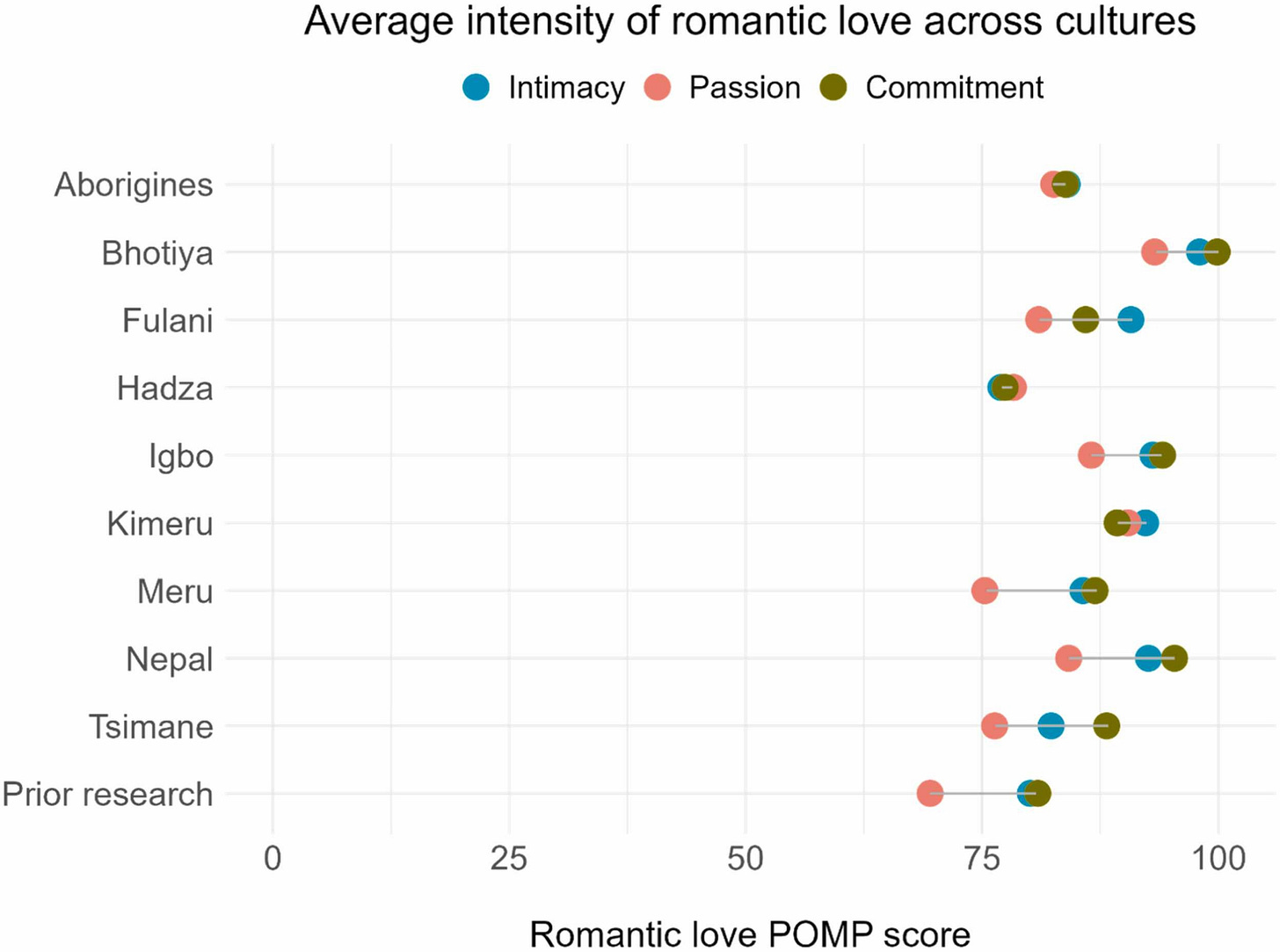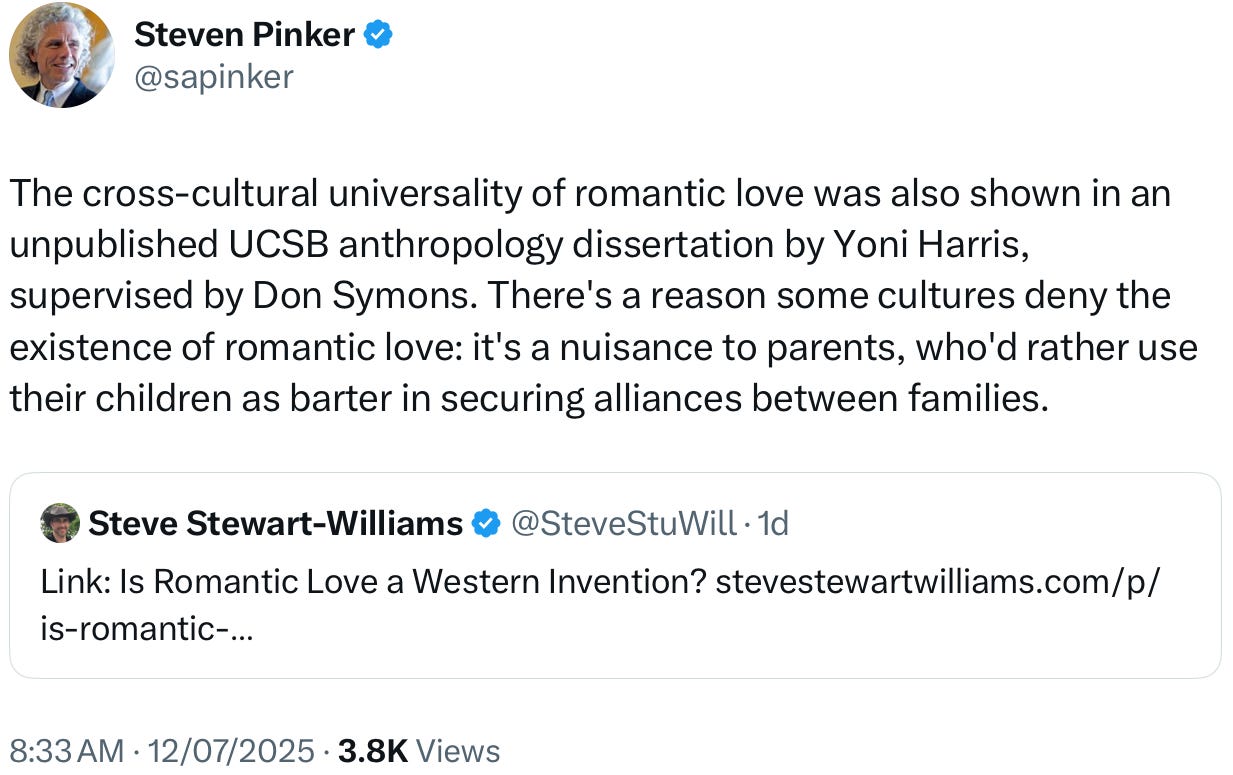Is Romantic Love a Western Invention?
No

In Case You Missed It…
The Latest from Mars and Venus: Eight New Findings on Sex Differences
12 Things Everyone Should Know About the Psychology of Victimhood
Does Intelligence Protect Against Mental Illness? A New Study Says Yes
According to a popular anthropological theory, romantic love is an invention of Western culture - a sentimental fiction perpetuated by Hollywood movies, pop songs, and Valentine’s Day cards. On this view, love is less a natural human experience than a cultural performance, scripted in the West and not found anywhere else.
But new cross-cultural research by Piotr Sorokowski and colleagues adds to a growing body of evidence suggesting that this view is false, plain and simple. Romantic love isn’t a cultural quirk. It’s part of human nature.
Sorokowski and his team surveyed ten small-scale, non-Western societies: societies comparable to those our ancestors lived in for most of our evolutionary history. If love were merely a Western invention, we wouldn’t expect to find it in these groups. But we do. All ten societies exhibited the three core ingredients of romantic love as conceptualized in the West: passion, intimacy, and commitment. And not only were these elements present, they were similar in intensity across all cultures. The graph below lays out the data.
These findings dovetail with other research suggesting that that romantic love is an evolved feature of human psychology, rather than a Western fantasy. Here’s an excerpt from my last book, The Ape That Understood the Universe, where I make the case for this position.
[C]ontrary to stubborn anthropological myth, people everywhere fall in love. One line of evidence for this claim comes from the anthropologists William Jankowiak and Edward Fischer, who scoured the anthropological research on 166 historically-independent cultures, noting down any evidence of romantic love they came across: romantic poetry, elopement, all the usual symptoms. Their conclusion? Romantic love was unambiguously present in around 89 percent of cultures - the vast majority. Note that love wasn’t necessarily absent in the remaining eleven percent; it simply wasn’t clear either way. If the ambiguous cultures had all been clustered together, then maybe we could argue that love was a contagious meme which had spread to most of the world but hadn’t yet reached that region. Instead, though, the ambiguous cultures were dotted round the globe at random, and romantic love was clearly present in all or nearly all cultures from every world region: Africa, Europe, Asia, the Americas, Polynesia. This suggests that love actually is universal, and that if we just looked a little bit harder, we’d find it in every culture…
The question all these findings raise is a straightforward one: If romantic love is an invention of Western culture, why is it found in every geographical region, historical period, and ethnic group? The simplest and most plausible answer is that romantic love is not an invention of Western culture. Instead, the idea that romantic love is an invention of Western culture is itself an invention of Western culture, and a rather implausible one at that. Human beings were falling in and out of love for hundreds of thousands of years before we ever had Hollywood blockbusters or knights in shining armor. We’re just that kind of animal - the kind that falls in love from time to time.
You can access the Sorokowski paper here.
You can read the first chapter of my book The Ape That Understood the Universe for free here.
Addendum
Here are some afterthoughts based on an email exchange I had with Yascha Mounk. Yascha pointed out that, in China, many young people are now uninterested in love and romantic relationships. My thoughts:
Even if most young people don’t care about love, that’s distinct from the question of whether they have the capacity to fall in love. I’d put my money on the fact that they do. Perhaps it’s similar to how monks and ascetics don’t seek worldly success, but would still have the capacity to enjoy it if they did…
I used to say I didn’t believe in love, would never want to get married, all the usual stuff. But it happened anyway. I can buy that fewer people these days prioritize love and marriage as a life goal. And if that means fewer go looking for it, then fewer people will end up in relationships. But many still will, despite their protestations. And again, that’s separate from the question of the innateness of romantic love.
Also, here’s a tweet from Steven Pinker on the topic:
Follow me on Twitter/X for more psychology, evolution, and science.
Coming Soon to The Nature-Nurture-Nietzsche Newsletter…
Sexual Assault as a Crime Against the Young
Top 10 Friedrich Nietzsche Quotes
Cognitive Chicanery: Four Ways We Dodge Facts That Offend Us
Some big news about my next book
How You Can Support the Newsletter
This post was free to read for all. If you like what I’m doing with The Nature-Nurture-Nietzsche Newsletter, and want to support my work, there are several ways you can do it.
Like and Restack - Click the buttons at the top or bottom of the page to boost the post’s visibility on Substack.
Share - Send the post to friends or share it on social media.
Upgrade to Paid - A paid subscription gets you:
Full access to all new posts and the archive
Full access to exclusive content such as my “12 Things Everyone Should Know” posts, Linkfests, and other regular features
The ability to post comments and engage with the N3 Newsletter community.
If you could do any of the above, I’d be hugely grateful. My goal is to make the newsletter a space for free thought and non-politicized psychology, and ultimately to make it a viable alternative career. The support of readers like you is what makes this possible.
Thanks!
Steve Stewart-Williams




It’s such an odd quirk - the “uniqueness” hypothesis for want of a better name.
Humans can be led to believe that only men have a behavior or only women a behavior, instead of understanding that humans are wired for all possible behaviors, but internals and society promote some and suppress others in individuals.
This is the correlative at the societal level.
Humans can’t even accept we are wired for behaviors as animals are - pair bonding, lying. We are “unique”.